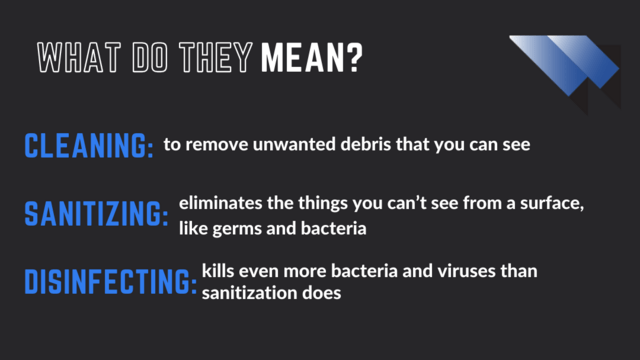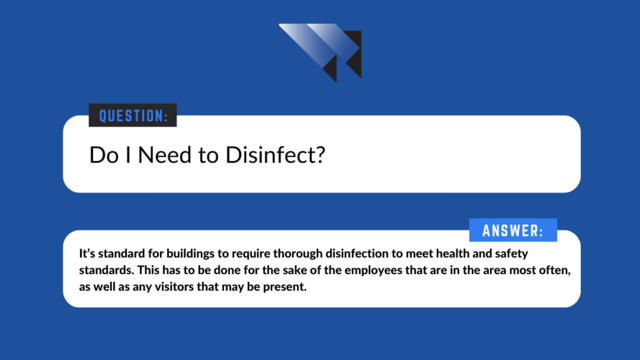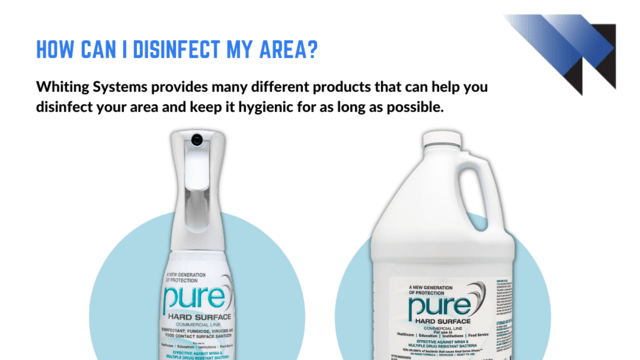
Cleaning, Sanitizing, and Disinfecting: FAQs
August 26, 2022
Cleaning, sanitizing, and disinfecting are essential parts of modern living. It’s been true for decades, and became even more important after the COVID pandemic era. People have started taking their health more seriously. Now more than ever, they are paying attention to how things are cleaned, sanitized, and disinfected.
Even with this new focus on health and cleanliness, not everything is clear to the average person. Although the words seem like they mean the same thing, on a technical level, there are differences in being clean, being sanitized, and being disinfected.
Luckily, Whiting Systems is here to help guide you through the differences between these words, and to show you how you can keep offices, automobiles, restrooms, hospitals, and many other areas as safe as possible for both staff and visitors.
Cleaning, Sanitizing, and Disinfecting: What's the Difference?

A lot of people use these terms interchangeably, but they do actually have different meanings. Cleaning something means to remove unwanted debris that you can see. Basically, when you clean, you’re wiping away dirt, dust, or anything else you can see on the surface that you want gone.
When you sanitize something, you’ve gone up a level from basic cleaning. Now you’re eliminating the things you can’t see from a surface, like germs and bacteria. When something is sanitized, according to many health and safety agencies, that means 99.99% of bacteria has been removed. Most hand sanitizers, like Whiting's Antiseptic Handz-Free Alcohol Hand Cleaner.
Disinfecting takes this even further, killing even more bacteria and viruses than sanitization does. While sanitization kills 99.99% of harmful bacteria, disinfection kills 99.999%. The difference between these two degrees of cleaning will ultimately come down to the kinds of chemicals you use.
The Importance of Disinfecting

Many modern cleaning products are created to kill bacteria, so it’s unlikely you will ever need to choose between cleaning and sanitization/disinfection. When it comes to choosing between sanitizing and disinfecting, most people will choose to disinfect their areas.
The main places in a building that require the most thorough disinfecting will be the places that are at the most risk for bacteria. This will primarily be the kitchen or break rooms. Places like this will usually benefit from having larger quantities of disinfectant, like PURE® Hard Surface 5 Gallon Disinfectant.
Other places, like restaurants and hospitals, will require the most thorough cleaning throughout the building to keep up with health and safety standards. These locations are perfect for the Portable Mister, an attachment that makes the process go faster without sacrificing disinfecting efficiency.
Even though special focus should be applied to these areas when cleaning, it’s important not to neglect other areas where people will commonly be. Because of this, it’s better to go with products that mention disinfecting.
While there are some parts of a building that may not need such thorough cleaning, doing this ensures that the area is guaranteed to be as safe and free of bacteria as possible.
How to Keep Things Properly Disinfected

The best options for this task will be the PURE® Hard Surface disinfectants. Whiting Systems doesn’t just deal with disinfecting surfaces, and has hand sanitizer as well to ensure the maximum amount of harmful bacteria and viruses are dealt with.
If you think you'll use a massive quantity of disinfectant on a regular basis, Whiting can take care of that, too, with the PURE® Hard Surface 55 Gallon Disinfectant Drum. Along with a large amount of Whiting's high quality disinfectant, this product also comes with a portable mister to speed up your efforts.
Whiting Systems doesn’t just stand by PURE® as a disinfectant for trucks and offices. It’s recommended for any of the following locations:
Churches
Courtrooms
Daycares and Retirement Homes
Gymnasiums
Hotels
Hospitals
Manufacturing Plants and Warehouses (including those in the food industry)
Offices and Meeting Rooms
Public Transportation
Rental Cars
Restaurants
Schools and Universities
Equipping your janitorial staff with the most effective tools in disinfecting is the best way to make sure your workplace stays as safe and as healthy as possible, and Whiting Systems can help you do just that.
